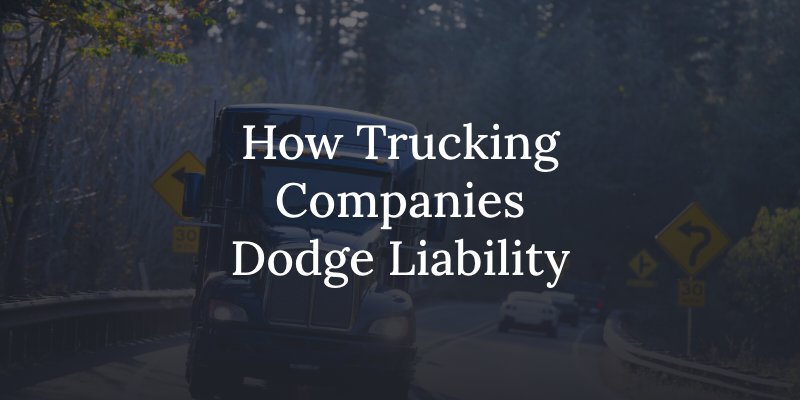How Trucking Companies Dodge Liability for an Accident
Request Free ConsultationLarge commercial trucks pulling loaded trailers pose a significant threat to motorists in smaller vehicles when collisions and crashes occur. The size and weight difference between large trucks and standard vehicles is substantial and leaves motorists vulnerable to serious or catastrophic injuries with pain, suffering, disability, and expensive economic damages. Unfortunately, trucking companies routinely deny accountability and use specific tactics to insulate themselves from liability for truck accidents that cause grave harm to others.

Using Independent Contractors Rather Than Employees
One of the main methods large trucking companies use as an attempt to dodge liability is to work through independent contractors as drivers rather than hiring direct employees. While employers may be held liable or partly liable for a truck driver’s actions if they are employers, an independent contractor is its own entity and liable for damages rather than the trucking company itself. They may also use subcontractors such as smaller companies that own trucks and employ drivers. This further distances the company from consequences when accidents occur. Fortunately, a skilled truck collision attorney in Kansas City often proves a trucking company liable for damages under many circumstances, such as when the company doesn’t properly vet driver qualifications or sets unrealistic delivery goals that result in speeding or driving hour violations. Also, the U.S. Department of Labor’s new rules on differentiating between independent contractors and employees make it more difficult for trucking companies to dodge liability through this tactic.
Pointing the Finger Elsewhere
It takes many entities to ensure a loaded commercial truck is well-maintained, safely loaded and has a fully-qualified driver behind the wheel. After an accident, a trucking company may try to avoid liability by pointing the finger at other parties including the following:
- The manufacturer of a defective truck part or equipment
- A negligent truck maintenance service
- A negligent freight loading company whose employees failed to properly secure a load or left unbalanced cargo
- The driver of the smaller vehicle involved in a collision
- Negligent road maintenance departments
Despite the array of parties involved in commercial trucking, a trucking company is responsible for the consequences of mistakes made at other levels of their business or they share a portion of liability for contributing to the cause of the accident.
Questioning Damages
Trucking companies have powerful insurers who protect their profits at the injury victim’s expense. They may deny that an injury victim’s doctor-recommended treatment is necessary for their injury, or question how the injury victim’s Kansas City injury attorney calculated their damages. If an injury victim didn’t go directly to a hospital but developed symptoms later—which sometimes occurs in injuries with delayed symptom presentation such as whiplash and traumatic brain injuries—the trucking company’s insurer might dispute that the injury occurred in the crash due to the victim’s delay in seeking medical treatment.
Use an Injury Victim’s Words Out of Context Against Them
At the scene of the accident, injury victims may make statements during the rush of adrenaline, such as “I’m okay,” or “I’m sorry.” The insurance company may intentionally interpret this as an admission of fault or as “evidence” that the accident survivor wasn’t injured in the accident. Insurance adjusters also commonly call injury victims on recorded lines and sound compassionate and concerned, when their true objective is to use the accident survivor’s words out of context against them. It’s always best to hire an injury attorney after an accident with substantial damages like property damage, medical expenses, and lost wages, but it’s even more crucial after an accident with a commercial truck. Trucking companies have the upper hand when an accident victim doesn’t have skilled, assertive legal representation protecting their best interests.

